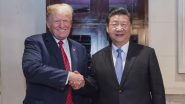New York, May 3 (AP) A bipartisan group of two dozen lawmakers is asking the Securities and Exchange Commission to put the brakes on an initial public offering by Chinese fast fashion retailer Shein until it verifies it does not use forced labour from the country's predominantly Muslim Uyghur population.
Shein hasn't said whether it plans to go public this year, but some news outlets have reported in the past few months that the company is raising money in anticipation of a U.S. listing in the second half of this year.
Also Read | Ajay Banga, Indian-American Business Leader, Becomes World Bank President Unopposed.
The letter also comes a few weeks after the launch of an anonymous coalition of "like-minded individuals and businesses” called “Shut Down Shein,” which is aiming to increase scrutiny on the company in Washington and ultimately get it booted out of the U.S. marketplace.
Chapin Fay, a managing director at Actum, a consultancy firm that works with the group, said he's met with congressional offices to discuss Shein. Fay declined to disclose who funds “Shut Down Shein," but said its members include American brands and human rights organizations.
In the letter sent to SEC Chair Gary Gensler, lawmakers cited a Bloomberg report from November that said some garments shipped to the U.S. by Shein were made of cotton from China's Xinjiang region. They're asking the SEC to certify via “independent verification" that the company does not use Uyghur forced labor.
“We strongly believe that the ability to issue and trade securities on our domestic exchanges is a privilege, and that foreign companies wishing to do so must uphold a demonstrated commitment to human rights across the globe,” lawmakers wrote in the letter.
Shein spokesperson Peter Pernot-Day said in a prepared statement that the company takes visibility across its entire supply chain seriously.
“We are committed to respecting human rights and adhering to local laws and regulations in each market we operate in,” Pernot-Day said. “Our suppliers must adhere to a strict code of conduct that is aligned to the International Labour Organization's core conventions. We have zero tolerance for forced labor.” (AP)
(This is an unedited and auto-generated story from Syndicated News feed, LatestLY Staff may not have modified or edited the content body)













 Quickly
Quickly

















